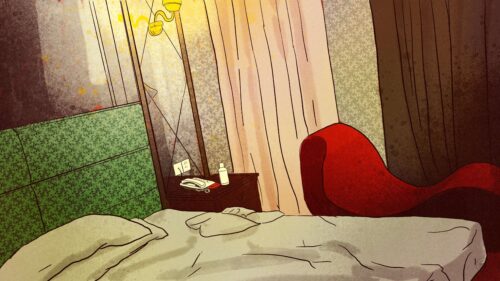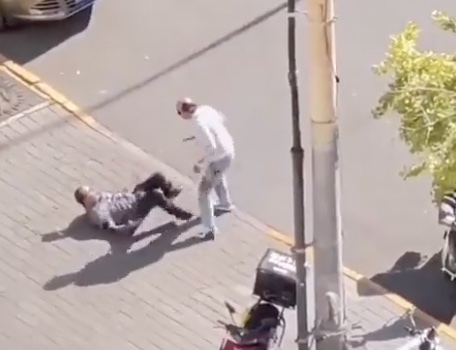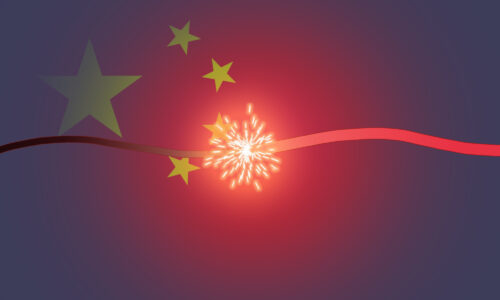A crashed Ferrari in the heart of Beijing
Q&A with author Tom Pellman on his novel "The Soul of Beijing," capturing society through fiction, and the changing face of the city

Longtime China resident Tom Pellman’s novel The Soul of Beijing was published by Camphor Press today. The book follows a panoply of characters — from an investigative journalist to a disaffected youth, a corrupt property developer to a cynical expat — tied together by a fateful Ferrari crash at the heart of the city. Te-Ping Chen, author of Land of Big Numbers, called it “a beautifully constructed page-turner, one that zings and zaps, full of sharp detail and many moments of grace.” I caught up with Tom on Zoom, in his new home of Washington DC, to talk about the book, its themes, and the ever-protean ‘soul’ of Beijing.
Tom Pellman, I’ve known you since 2012 in Beijing and I just reread your novel, which I absolutely love. Can you walk us through how you conceived of the book, when you wrote it, and maybe give us an elevator summary of what to expect between the covers?
I lived in China from 2005 until the end of 2016. And most of those years, the last eight, were in Beijing. I started on the book in 2011, and worked on it off and on until 2016. The book is about Beijing, the way that I think about the city. It follows the lives of a handful of characters who come from different parts of society, and how their lives come together through a central Ferrari car crash. When I was starting the book, it wasn’t about the political intrigue behind a car-crash cover up. But as I was thinking about a vehicle with which to pull the lives of different people together from across the social spectrum, I thought that was an interesting way to do it.

A literal vehicle functioning as a figurative vehicle. You say you conceived of the book in 2011, but I couldn’t stop wondering if that car crash plot point was inspired by Politburo member Líng Jìhuà’s 令计划 son’s Ferrari crash in 2012?
I did originally conceive of a central car crash before that, but when the Ling Jihua situation unfolded, I thought, wow, an unlicensed Ferrari and the subsequent cover up would be an even more heightened version of how to bring together high and low parts of society. So the car became a Ferrari.
Why did you choose to write a novel, instead of a memoir or journalism? How, to you, can a novel convey what nonfiction cannot?
I’ve always been interested in fiction writing, whether short stories or longer form. In the case of this story, I wanted to get inside the heads and under the skin of a lot of different people. So I think that writing a memoir would have been good for sharing my thoughts and reflections about living in China myself. But the experiment, and frankly the fun, of thinking about the city and how it might appear to people from different walks of life really appealed to me. I was refracting my own experiences of the city through the eyes of invented characters. Also, on a more mundane level, I was working full time and had other things going on, so I didn’t have the time or training to go out and do really in-depth research and reporting about these things. So I used my imagination as a kind of shortcut. Also with journalism, I think it’s difficult to convey some of the larger, I guess emotional, issues or conditions with the city.

Books take a long time to publish, and you finished this novel in the fall of 2016. How big a problem is it that Beijing and China have changed so much in the interim?
I mean, there’s no getting around it. Beijing is a very dynamic place and is always changing. It’s one of the things I love about it. Any kind of long term project is going to be a work of collage in the end — you’re never going to be able to capture the city exactly as it is at any particular time. Now that the book is out, there’s lots of places in it that have changed completely from when I described them. My hope is that in exploring some of the bigger themes of Beijing, that doesn’t change. And I hope that there’s universal value in the character arcs and the way they interact with the city, so I think it is still relevant today.
And it does function as a record of those exciting years of Beijing, in the late aughts and early tens. Do you ever get nostalgic about it, and what do you miss the most?
I do get nostalgic for Beijing, but I wouldn’t say it’s chronic. What I miss the most is the dynamism of the place. The idea of being able to explore different parts of the city, and knowing that it’s always going to be changing and there’s always new things to find, and that the people are out there doing stuff. Since I left in 2016, I really haven’t spent much time back in China, but I think hopping on a plane and going back to Beijing now wouldn’t satisfy any of that nostalgia, because what I miss is that point of time, that group of friends, and who I was at that point in my life. But it’s great to have a record of it, even though this novel is not particularly autobiographical.
Now there is a foreign character in the book, David — an American who has lived in China many years, breaks into Chinese TV, then becomes very cynical about China before leaving in a huff. Were you trying to convey something about expats in China? And was it based on anyone that you know yourself?
I think there’s a little bit of David in myself, and in a lot of people I knew who lived in Beijing a long time. David is not based on me, nor on anyone specifically that I knew during that time, but he’s kind of an archetype of a certain type of foreigner. What I was really interested in and compelled to write about is the idea of someone who starts their China journey with a certain amount of esteem and respect and status as a foreigner, and then China grows up and leaves him behind. I liked to explore how someone deals with becoming irrelevant, or is scared to leave China because he doesn’t have much to show for it. That came up in a lot of conversations with people that I’ve known. In David’s case, he deals with that by lashing out against China and how it’s unfair.
I don’t think there’s anything about China per se that makes people cynical or hardens them. But it takes a toll.
Well, having just left China after ten years I can relate, although hopefully I didn’t pull a ‘David’. Other characters, in my reading, also get more cynical and hardened as the novel progresses. For example Sun Zhenhua, a city-planning official who starts idealistic and ends…well, readers will have to buy the book.
I think Zhenhua’s arc is the saddest story in the book. He’s the character who is really caught up in circumstances that he’s not in control of, and which end up shaping his outlook on life. I don’t think there’s anything about Beijing or China per se that makes people cynical or hardens them. But I think that for people who are in certain environments, such as politics in Beijing, it takes a toll. If you have a good natured spirit, or a lot of generosity, that can be beaten out of you to some degree. And when that happens, you have to become cynical as a way of coping, which is also isolating. So you ultimately just end up alone. And people are really the only way out. Showing some measure of compassion and sympathy and even spiritual connection with other people is the only way to avoid that trap. The characters in my book that realize this find some kind of solace, but those that are in denial or can’t find it tend not to fare as well.
One of those more hopeful characters is Panzi, the novel’s protagonist of sorts, a young Chinese guy whose girlfriend is affected by the Ferrari accident. Panzi goes through a long struggle coming to terms with the impact of the crash, and becomes obsessed with the rich second generation Chinese who was driving the car. Yet by the end of the novel it seems Panzi has come to some sort of catharsis, and there’s a glimmer of hope at the end.
To me, Panzi is a character that never really fit into the mainstream of Chinese society. I think he’s disaffected. He also has family and emotional baggage. When he meets Xiao Song, I think he’s enlivened and feels a sense of hope and connection. Then when that’s taken away from him, what he really wants is to feel that life is not going to go back to what it was like before, that he can become a different person. I think he’s really concerned with feeling useless about not adding anything to society. So I think that his emotional journey is to understand that even though he’s affected negatively, there is something he can do with that experience and pass on what he’s learned, which gives his life meaning.
In a sense, the rich young Chinese guy driving the car is a mirror image of Panzi, also lost and disaffected.
Exactly. But the difference is that he can’t express it. When the crash happens, it is covered up for family and political reasons. And when people aren’t allowed to grieve or be in touch with their own emotions, that stuff gets bottled up, and needs a release. In the case of Panzi, he gets his own release, but he’s also the agent that affects that release elsewhere.
How confident were you writing from the perspective of Chinese characters? And how did you research them?
Most of the research for the characters just came from living in Beijing, and from having Chinese friends and interacting with people that I knew there. With regards to the backgrounds that they came from, it’s a collage of people that I’ve met and from my own imagination. Obviously, writing about Chinese characters as an American, you want to be sensitive in portraying people in a well rounded way. But it was a process, and the characters became more individual in my mind as I worked on the book.
One such character who leapt out for me the Boss of Houhai, a property developer and shadowy Kingmaker who is also just there squatting in the hutongs with a fag and his belly out. What was your inspiration for him?
So that’s the easiest answer so far. That’s a real person I actually met on Nanluoguxiang one day — a guy with a birthmark on his face, in his pajamas with a big gold chain, drinking beers. We got into conversation, and he told me that he knew all the property developers in town, and had worked at this state-owned milk company, and obviously I didn’t verify a lot of his claims — they were too good to be fact-checked — but I just kind of went with the things he told me and used my imagination to extrapolate.
All of these characters are connected through the nexus of the car crash, but also through the locus of the Duan Qirui Former Government Building (段祺瑞執政府), a late Qing era construction with European architecture where the crash happens, and which later becomes the site for a contentious property development. How did you settle on that location for it?
In Beijing I lived relatively close to the Duan Qirui building, which is at the Zhangzizhonglu subway junction. I came across it one day while walking around, and I thought it was very special place, so quiet and with European inspired buildings in the middle of Beijing. So it started with me spending time there and chatting to some of the people who lived there. The property development plot was all made up, and I hope that they’re not making it into a luxury, five-star development now. But in those days, you could pretty easily see how something like that would be possible. The other feature that I really liked is across a busy intersection from the Duan Qirui building — a large spirit wall that is completely white. I was always drawn to that spirit wall, and it appears in the book as well. Some symbolic value to it, I think, too.
How do you think the novel would be different if it was written in the Beijing of today, post-COVID?
Gosh, I don’t know. Real estate is kind of a through-line in the book, and seemed like a really good lens to see a lot of the power dynamics in society. I don’t know if real estate would still be that through-line if it was happening today. Maybe there would be some other kind of element that brought it all together. Also there’s a lot more surveillance on the streets of Beijing than there used to be. There is definitely still dynamism and engaging stories that are happening in Beijing, but they would be of a different character. I think the yearning for some kind of spirituality or deeper meaning, though, is a theme that would still be there for sure.
I’m going to read my favorite passage of the novel, to give readers a sense of your prose:
Those who thrived in Beijing were, like the city itself, unfinished. Beijing was a mirror that held their own great contradictions: chaos and order, potential and failure, hope and cynicism. And the glass warped over time until the city’s hardships became its charms, and it no longer made sense to talk about loving or hating parts of it — the extremes came full circle. To the enlightened expat, hating Beijing meant loving it.
Do you still feel that way about Beijing through the prism of memory? Do you love hating it?
It’s such a special place, and has a big place in my heart. When I wrote this novel I was still living in Beijing, and the day-to-day stresses and things that make it a difficult place to live in – I was not always enlightened in the moment about loving those things as much as hating them. But now, being afar and feeling nostalgic about the city, I feel a lot of love for it still.
For more tales of Beijing, also read While We’re Here, a 2016 compilation of stories by expat writers edited by Alec Ash and Tom Pellman.





